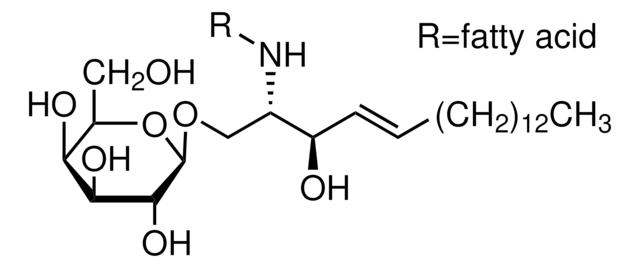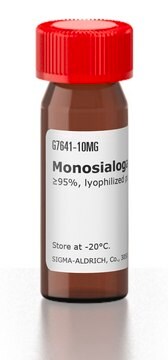S1006
Sulfatides from bovine brain
≥97% (TLC), powder
Sinónimos:
Cerebroside sulfate
Iniciar sesiónpara Ver la Fijación de precios por contrato y de la organización
About This Item
Código UNSPSC:
12352200
NACRES:
NA.77
Productos recomendados
Descripción general
Sulfatideis a glycospingolipid and plays an essential role in host-pathogen recognition,β-cell function, infection, haemostasis/thrombosis, protein trafficking, cellgrowth, cell adhesion, neuronal plasticity, cell morphogenesis, and signaltransduction. It is found on the surface of the blood cells such asplatelets, leukocytes, and erythrocytes. Sulfatides are also found in the serumas glycosphingolipids in lipoproteins. It is made up of glycan part, a hydrophobic part, 3-O-sulfated galactose, and ceramide, which in turn is composed of a sphingosine base and a fatty acid. It is an important component forthe maintenance of the myelin sheath andproper formation of the axo-glial junctions. Variations in the production ofsulfatides are associated with various human diseases like cancer andimmunological disorders. Alterations in the sulfatide metabolism lead to synapticdysfunction, neurological decline, inflammation, and myelin deterioration.
Sulfatide is a 3-O-sulfogalactosylceramide consisting primarily of galacto cerebroside sulfate. It is localized in myelin sheath and comprises approximately 4% of total myelin lipid in brain.
Aplicación
Sulfatides has been used in:
- enzyme linked immunosorbent assay (ELISA) in human plasma samples
- thin layer chromatography in myelin membranes
- in sulfatide binding assay of properdin
Acciones bioquímicas o fisiológicas
Sulfatides play a key role in physiological processes of nervous system, immune system and in insulin secretion. Anomalies in sulfatides catabolism in lysosome is implicated in late infantile metachromatic leukodystrophy. High levels of sulfatides is also observed in ovarian cancer. Sulfatides contribute to the pathogenesis of chronic inflammatory diseases of the central nervous system.
Código de clase de almacenamiento
11 - Combustible Solids
Clase de riesgo para el agua (WGK)
WGK 3
Punto de inflamabilidad (°F)
Not applicable
Punto de inflamabilidad (°C)
Not applicable
Equipo de protección personal
Eyeshields, Gloves, type N95 (US)
Elija entre una de las versiones más recientes:
¿Ya tiene este producto?
Encuentre la documentación para los productos que ha comprado recientemente en la Biblioteca de documentos.
Los clientes también vieron
Elevation of sulfatides in ovarian cancer: an integrated transcriptomic and lipidomic analysis including tissue-imaging mass spectrometry
Liu Y, et al.
Molecular Cancer, 9(1), 186-186 (2010)
Natalia A Crivello et al.
The Journal of nutritional biochemistry, 21(11), 1083-1088 (2010-01-23)
Dysregulation of myelin sulfatides is a risk factor for cognitive decline with age. Vitamin K is present in high concentrations in the brain and has been implicated in the regulation of sulfatide metabolism. Our objective was to investigate the age-related
Sulfatide-binding assay for von Willebrand factor: detection of von Willebrand's disease without discrimination of vWD subtypes
Favaloro EJ
Thrombosis Research, 98(2), 213-219 (2000)
C Mazurier et al.
Bailliere's clinical haematology, 9(2), 229-241 (1996-06-01)
von Willebrand disease (vWD), the most common congenital bleeding disorder in man, is related to quantitative and/or qualitative abnormalities of von Willebrand factor (vWF), a protein necessary for platelet-vessel wall interactions and for carrying factor VIII. Distinct abnormalities of vWF
A recombinant two-module form of human properdin is an inhibitor of the complement alternative pathway
Kouser L, et al.
Molecular Immunology, 73(11), 76-87 (2016)
Nuestro equipo de científicos tiene experiencia en todas las áreas de investigación: Ciencias de la vida, Ciencia de los materiales, Síntesis química, Cromatografía, Analítica y muchas otras.
Póngase en contacto con el Servicio técnico










